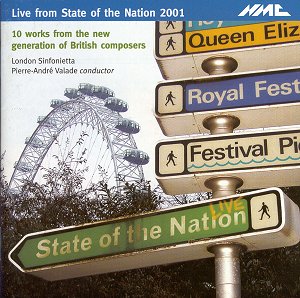Hosted and organised by the London Sinfonietta on the
South Bank, State of the Nation fulfils a vital function in its showcasing
of up and coming British compositional talent. There are still all too
few opportunities for young composers on this kind of level and this
disc provides a useful overview of the music heard at the 2001 festival.
As Gillian Moore comments in her booklet introduction,
the intention is to reflect the diversity of the contemporary scene
by including works involving electronics, mixed media and new modes
of presentation and it is true that this diversity seems to come through
more successfully than in the earlier NMC release of music from Hoxton
New Music Days (NMC D076) where there appears to be something more of
an agenda in the selection of the composers featured.
Not all of the works here are presented in their entirety
and in the case of Joe Cutlerís Without Fear of Vertigo
and Richard Ayresís No. 24 Noncerto there are opportunities to
assess how well the works stand up musically without the presence of
mixed media artist Tom Daleís film which was projected simultaneously
in the Cutler and the absence of the strong visual performance element
that clearly plays its part in the Ayres.
The disc is framed by the two electro-acoustic contributions
included, Wolfie by Jo Thomas and Peter Batchelorís Steaminí,
an impression of the power and rhythmic energy generated by a steam
locomotive. Thomasís brief (1í39") yet entertaining piece, written
for the Sonic Arts Network, centres around the story of Little Red Riding
Hood, using the female voice to evoke the various dark, emotional states
of the story in an imaginative sound-world. Steaminí is remarkably
vivid in its atmospheric portrait of the clank of couplings, grind of
wheel on rail and momentum of pistons, Batchelor effectively capturing
a sense of fun at the same time.
Scottish born but having spent some time in the United
States, David Horne provides one of the most impressively accomplished
contributions to the disc in Broken Instruments, a kind of abstract
study in dominant and submissive instrumental timbres, deliberately
"dysfunctional" in structure and demonstrating a fine ear
for textural detail and sonority. In many ways, despite the "abstract"
of the title, the three of Luke Bedfordís Five Abstracts presented
here are the musical opposite of the Horne work, two of the pieces being
based around a single line melody or monody which in the case of piece
No. 2 is gradually built and elaborated to a climax, whilst the melody
in No. 5 eventually transforms itself into a harmonically related chorale.
The result is both haunting and assured for a composer only just reaching
his mid-twenties and who promises much.
I was less convinced by Larry Govesí walking underground,
in which the intention, through two conflicting ideas, is to create
a sense of momentum devoid of distance, as the composer describes it
"a snap-shot of a never-ending musical process" with little
harmonic or conventional development of the material. Goves cites Feldman
as an influence and the aesthetic of the American is evident, but ultimately
the music does not quite succeed in drawing the listener in as Feldman
does. Tansy Davies, one of only two female composers included on the
disc, has already received considerable critical attention and her Small
Black Stone, a typically tough, concentrated duo for viola and piano
inspired by an interest in black holes, rocks and the words of Sugar-Paper
Blue, a poem by Ruth Fainlight, receives a superbly committed performance
by Paul Silverthorne and John Constable.
Of all the composers featured Rolf Hind is the name
most recognisable, albeit for his more familiar persona as pianist.
Hind is exceptionally self critical of his own music which possibly
accounts for the fact that his work is still relatively little known.
Solgata, appropriately for piano and played by the composer,
describes the path of the sun on water and was intended as a companion
piece to the earlier Cloud Shadow. [interesting to compare these
pieces with Peter Maxwell Daviesí Image Reflection Shadow. Ed.]
"Tampering with the piano" as Hind puts it,
creates some fascinating sounds, not least when the music submerges
to an underwater perspective part way through. Fraser Trainerís The
Colour of Scars, features a prominent part for soprano saxophone,
finely played by Simon Haram and, in the three of seven sections recorded
here, takes the listener through a landscape of blues influenced sounds
pitted against those with a harder edge, the result bearing more than
a passing resemblance to the sound-world of Mark-Anthony Turnage.
Of the two works mentioned earlier with a visual element
involved, Joe Cutlerís Without Fear of Vertigo stands
up particularly well in its own musical right, a manic work for ensemble
of ceaseless, teeming energy whilst Richard Ayres No. 24 Noncerto,
a mini concerto for alto trombone and ensemble, is a somewhat maverick,
at times highly amusing work by a composer who studied with Louis Andriessen
and is currently resident in the Netherlands. A clue as to Ayresí personality
can be taken from his list of influences, which include "Morton
Feldman, Billy Connolly, Billy Bragg and hard drink and fate",
the piece poking fun at minimalism and a range of other stylistic diversities
along the way but possibly not ultimately sustaining its fourteen-minute
duration.
A fascinating overview then of the current "state
of the nation", featuring several names to watch coupled with performances
of typical energy and accuracy by the players of the London Sinfonietta.
It is only to be hoped that this invaluable event remains a regular
fixture in the annual musical calendar.
Christopher Thomas


